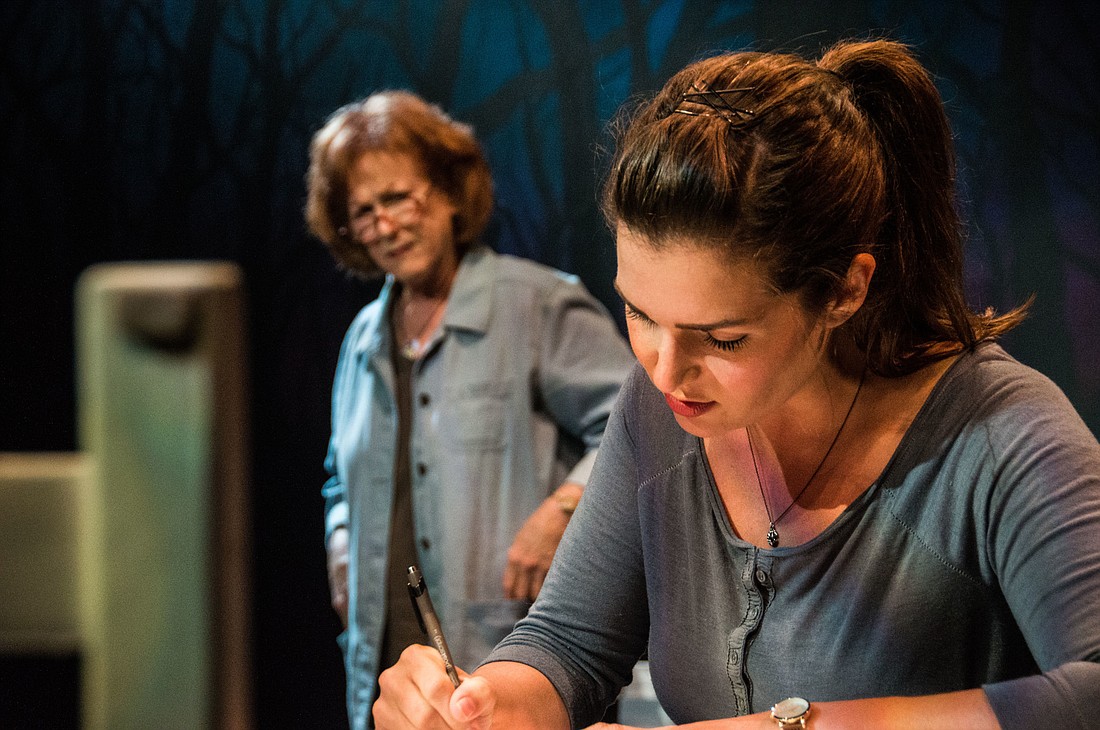- January 14, 2025
-
-
Loading

Loading

Writers are in the memory business. Journalists get the story; fiction writers make it up. But what if you can’t even remember your own story? For a writer, it’s the greatest fear. But that’s what happens in dementia. And that’s what happens to Alita. She’s the writer at the heart of Jennifer Haley’s “Breadcrumbs,” the Urbanite Theatre’s latest play.
Alita (Barbara Redmond) is a reclusive author with a painful backstory. She lives on her own, and she’s fiercely independent. At the start of the play, Alita knows that can’t go on. She’s just been diagnosed with dementia. Beth (Brittany Proia) is the nurse’s assistant who first tested her. Alita lets Beth into her home to help her write her autobiography. The two form an uneasy bond — and a weird, funhouse-mirror reflection.
Alita’s a loner. Beth throws herself at any man who looks at her. Beth reminds Alita of the irresponsible mother who abandoned her. That’s the story Alita’s fighting to tell — and fighting not to tell. The characters periodically reenact that story in a series of flashbacks, with Redmond playing Alita’s childhood self and Proia playing her non-maternal mother.
The play keeps you off-balance, zips back and forth in time. You see Alita’s story in a broken mirror, darkly. Shards of past and present mingle. The fragmented narrative mirrors Alita’s broken state of mind. Where are you? When? What’s going on? You never really know. Alita suspects that Beth is trying to steal her story. Is that paranoia? Or is Beth really up to something? You’re never really sure what the truth is. But a few bits and pieces come into sharp focus …
Beth’s father rejected her; she unconsciously seeks out men who do the same. Alita’s mother bounced around from one Mr. Wrong to another. Her brainy, big-mouth brat made trouble. Alita’s mother ultimately dropped the precocious kid off at Disneyland and kept driving. Alita knows that her mother’s hunt for love caused her pain. She won’t make the same mistake when she grows up.
For Beth, helping Alita pick up the breadcrumbs of this harsh childhood memory is a form of redemption. For Alita, accepting help is a form of damnation. And she damn well knows she has no help to give.
Alita’s anger stays when her story blows away like leaves. Beth stays, even after Alita’s story is gone.
Brendan Ragan directs this lost-memory play with a restrained minimalism. Direction is usually about telling you where the story is going and giving you signs and cues along the way. Haley’s story demands the opposite. It’s a tale of the lost. Ragan honors that and takes you to places unmarked on any map.
The actors wander into that terra incognita with a raw, fearless honesty. Redmond’s Alita is brittle and domineering as an adult—and frightening and unfiltered as a child. Proia’s Beth is not so self-aware. She bravely walks Alita through the dark woods. It’s the bravery of blindness. Beth’s been hurt, but she really doesn’t know how bad the monsters can be.
Haley’s dark fairy tale unfolds in the dark realm of John C. Reynolds’ spare set. The fragment of a window. A door on wheels. Table and chairs. Squares of light inset into the floors. Projections of skeletal, dead trees on the walls. It’s enough to conjure a nameless terror. The woods are scary — and Alita’s lost in them.
It’s what she always feared.
As a child, Alita deconstructed the tale of Hansel and Gretel. She dumped Hansel and turned the gingerbread house into something organic and alive. (The meat computer housing the mind, perhaps.) In Alita’s retelling, squirrels, not birds, ate Gretel’s breadcrumb path home. Now Alita’s lost in the forest of forgetting and she can’t find her way home.
Sooner or later, that’s how everybody’s story ends.
It’s a true story. There’s a sad, harsh magic to it.
But that doesn’t make it any easier.